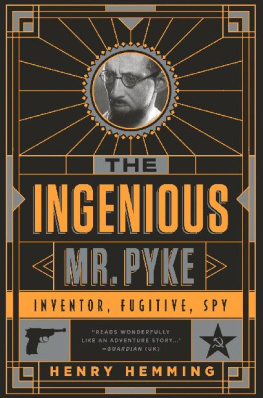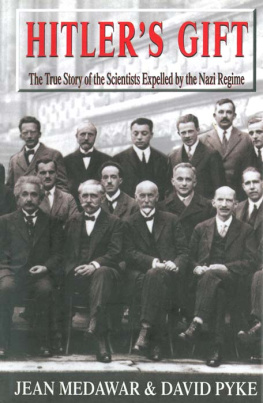
Also by Henry Hemming
Misadventure in the Middle East
In Search of the English Eccentric
Together
Abdulnasser Gharem

For BB

Copyright 2015 by Henry Hemming.
Published in the United States by PublicAffairs, a Member of the Perseus Books Group
All rights reserved.
Printed in the United States of America.
First published in Great Britain in 2014 by Preface Publishing
Random House, 20 Vauxhall Bridge Road, London SW1V 2SA
An imprint of The Random House Group Limited
No part of this book may be reproduced in any manner whatsoever without written permission except in the case of brief quotations embodied in critical articles and reviews. For information, address PublicAffairs, 250 West 57th Street, 15th Floor, New York, NY 10107.
PublicAffairs books are available at special discounts for bulk purchases in the U.S. by corporations, institutions, and other organizations. For more information, please contact the Special Markets Department at the Perseus Books Group, 2300 Chestnut Street, Suite 200, Philadelphia, PA 19103, call (800) 810-4145, ext. 5000, or e-mail .
The author and publisher gratefully acknowledge the permission granted to reproduce the copyright material in this book. Every effort has been made to trace copyright holders and to obtain their permission. The publisher apologizes for any errors or omissions and, if notified of any corrections, will make suitable acknowledgement in future reprints or editions of this book.
Text set in Bembo Book MT Std by Palimpsest Book Production Limited, Falkirk, Stirlingshire
A catalog record for this book is available from the Library of Congress.
Library of Congress Catalog Control Number: 2014952648
ISBN: 978-1-61039-578-6 (e-book)
First Edition
10 9 8 7 6 5 4 3 2 1
The fact is, if I may put the point in a somewhat comical way, that I have been literally attached by God to our city, as if to a horse a large thoroughbred, which is a bit sluggish because of its size and needs to be aroused by some sort of gadfly. Yes, in me, I believe, God has attached to our city just such a creature the kind which is constantly alighting everywhere on you, all day long, arousing, cajoling, or reproaching each and every one of you. You will not easily acquire another such gadfly.
Socrates in Platos The Defence of Socrates
CONTENTS


In what follows direct speech is taken verbatim from either contemporary accounts or memoirs.

February 1948
Mrs Hopkins, the daily help, knew very little about the man who had taken rooms on the top floor, so she was unsure what to make of the note on his door. She could tell you that his name was Geoffrey Pyke. He was just over six feet tall, wore a battered Homburg over his balding pate and walked with the stoop of a man recovering from illness. He was bearded, middle-aged and lean. He had large feet, spoke with a deep and musical timbre and received an unusual amount of post from overseas. As far as she was aware, he was a good lodger, in the sense that he took in few guests, kept to himself and was never late with his rent. But like most of those who encountered this man or heard stories about him from the fellow residents he passed on the stairs of this boarding house all the way to the King of England Mrs Hopkins was never really sure who he was.
By the time Geoffrey Pyke had moved to Hampstead, shortly before the end of the Second World War, he had collected an unlikely set of lives. Over the past two decades he had been described as everything from eccentric genius to war correspondent, jailbreaker, bestselling author, educationalist, speculator, mass-observer, advertising copywriter, political activist, military inventor and scientist, while for those in MI5, the British Security Service, Pyke was thought to be an undercover Soviet agent who had gone quiet in recent years. In each of these descriptions there was, it would later emerge, at least an element of truth.
The note on his door was brief: Please do not wake me.
Given the appalling weather outside this was not surprising. London was caked with snow and, with so many Londoners unable to get to work, Pykes decision to sleep in was understandable. But Mrs Hopkins was confused by his curtains being drawn well into the day while his lights remained on, as they had been since her arrival that morning. Something was not right. At around midday she knocked on his door.
Nothing.
And again.
Perhaps she shouted his name before trying the handle, only to find that the door was unlocked.
As usual his room was a mess, a papery metropolis of maps and journals, newspapers, statistical compendiums, letters stamped with the words Most Secret and heaps of notes, many of them on feathery paper topped with a tropical-blue government crest. His bed had been propped up at one end, an attempt to improve his circulation, and elsewhere Mrs Hopkins took in the familiar sight of tabletops, shelves and sections of floor buried beneath strata of sardine tins, biscuit packets, ashtrays, copies of The Times and the Daily Worker, an occasional dunning letter, cups of lapsang souchong, half-empty bottles and more of that notepaper cobwebbed with his spidery handwriting.
At last she saw him. He was stretched out in a chair by the window, arms loose by his side. His beard had gone and for once he looked indifferent to the world. Next to him there were three sealed letters and a sheet of paper bearing a message.
Outside, Hampstead remained blank with snow and nothing much moved. In the wider world soldiers were still returning from war while refugees tried to make their way home. Society was rearranging itself after six years of armed conflict, genocide and upheaval; it was starting to rebuild and reconfigure according to new indices of fear and hope, but it would do so without this man. Late on Saturday, 21 February 1948, aged fifty-four, Geoffrey Pyke had taken his own life. As Time magazine put it the following week, it was the only unoriginal thing he had ever done.
This is the story of a man described in his Times obituary as one of the most original if unrecognised figures of the present century. Geoffrey Pyke was hailed by J. D. Sage Bernal as not only a genius but one of the greatest [...] geniuses of his time. Lancelot Law Whyte, who helped develop the jet engine, compared him to Einstein, adding that Pykes genius was more intangible, perhaps because he produced not one, but an endless sequence of ideas. A scientist who worked alongside him felt he stood out among his fellows like the North Face of the Eiger in the foothills of the Alps. For another this was the sort of man who would have invented the wheel. Everyone seemed to agree on the quality of his mind, yet few could understand why he had committed suicide. Fewer still had any inkling that he might have led a double life.
Next page









![Nicholas Rankin [Nicholas Rankin] - Churchills Wizards](/uploads/posts/book/56578/thumbs/nicholas-rankin-nicholas-rankin-churchill-s.jpg)



